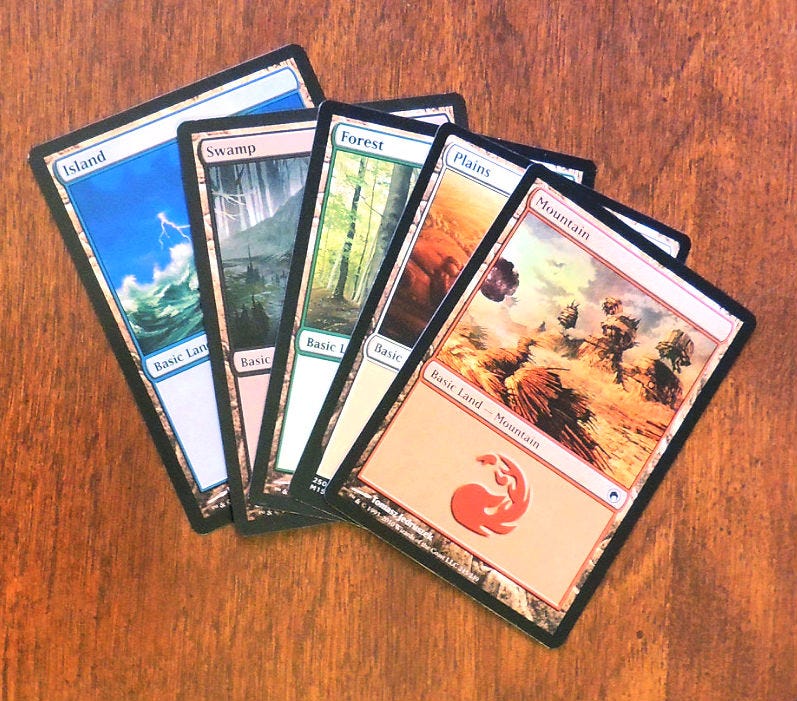This week, we interviewed Justin Davis, who writes Paperwave, a publication about the pleasures of board games, card games, and other cozy objects.
This interview has been lightly edited for length and clarity.
What’s your publication about in one sentence?
Paperwave is a newsletter about board and card games, Lego, art books, and other cozy objects likely to bring joy to nerds.
What inspired you to start a publication all about board and card games?
I have learned I am the opposite of a minimalist. I love “stuff”—because stuff isn’t just stuff! All of it is fascinating and interesting and has a story behind its creation. Board games are ingenious little clockwork inventions that imbue paper and cardboard with weight and meaning—for just a few hours, for just a few people—and then it all has to fit back into a small cardboard box. It’s awesome. Paperwave is the newsletter equivalent of a floor-to-ceiling bookshelf filled with books, puzzles, and games.
I’ve always admired sprawling Lego sets, board games, card collections, and other hobby items, but for 15 years we lived in a small apartment in San Francisco. Because of the pandemic, we relocated to the Midwest and now I have some extra space to go maybe just a tiny bit nuts indulging myself in all the cozy items we didn’t have room for before.
Additionally, I was a video game journalist for over a decade, but my role has shifted into management. I no longer get many opportunities to write. So with Substack, I can be creative again in a pretty frictionless and fun way, and share my growing passion and enthusiasm for these hobbies.
What are you hoping readers get out of it?
Paperwave is definitely written with newbies in mind! If you’re someone with no nerd gene at all, it may admittedly not be for you. But when I write about Magic: The Gathering, I’m not writing for the superfan. I’m writing for someone with some curiosity or admiration for the game’s art, complexity, or longevity. It’s perfect for people on the periphery of things, interested in learning more.
My favorite comments have come from readers newly encouraged to try their first Lego set as an adult or learning for the first time that there are board games designed for one player.

What are some examples of other topics and items you think can generate that cozy feeling?
I have a long list of topics I’m excited to eventually get into, and more than a few half-finished drafts. Magic Jigsaw Puzzles. Old D&D adventures reimagined as large, poster-size maps. Those cross-section books I think we all pored over as kids. Nineties counterculture zines. My most popular post was an intro to solo board games, so that’s a topic I’ll have more to say about too.
How did your love of board games begin?
Like a lot of people, my first “modern” board game was Settlers of Catan, around 20 years ago. I was first drawn to it because I didn’t know games could be so social and so strategic, relying on so much more than just rolling dice. But what kept me hooked was seeing the tactics in my play group grow and evolve from game to game, as we all learned different tricks and paths to victory. It was a revelation to learn a game could be played over and over, with a shifting meta-game emerging over time.
“Board games are ingenious little clockwork inventions that imbue paper and cardboard with weight and meaning—for just a few hours, for just a few people—and then it all has to fit back into a small cardboard box.”
What’s changed in the world of board games since the nostalgic classics many of us grew up with (Monopoly, Clue, Scrabble, etc.)?
So much! Most modern board games are really good about giving everyone a fighting chance to win, all the way up to the end, so you don’t end up with one unhappy player eliminated halfway through. There is also a huge movement toward cooperative or solo games, where everyone plays a role to work together to defeat the game itself, if you don’t want to compete.
The space has grown and evolved so that no matter what kind of subject matter appeals to you—fighting zombies, making a quilt, fitting a bunch of unruly cats onto a boat, or anything in between—there are games for you. The same is true for game mechanics. If you like rolling dice, playing cards, or even dexterity games similar to classics like Jenga, there are modern spins on them.
My personal favorite modern board game trend is the emphasis on “campaign” or “legacy” games. In these games you make permanent choices that carry over from game to game, marking up and adding stickers to your board or cards each time you play, so it’s never the exact same game twice.
What newish games would you recommend to someone looking to break out of a game rut?
My answers here probably aren’t very original—games like Ticket to Ride, Codenames, Sushi Go!, and Pandemic have all broken into the mainstream and onto shelves at places like Target for a reason. They’re all deliciously deep and are great at keeping players engaged with interesting, weighty decisions every turn, while still being easy to learn and quick to play through.

If you’re already into tabletop games, games from the past few years like Dune: Imperium, Wingspan, and Marvel Champions all build on previously established ideas in new and interesting ways, while smoothing out some rough edges along the way.
What’s another Substack publication you’d recommend?
Book Club by Numlock. You can vote on what book the group reads next and discuss the text as a group in the comments. Fun!
Subscribe to Justin’s publication, Paperwave, and find him on TikTok and Twitter.




